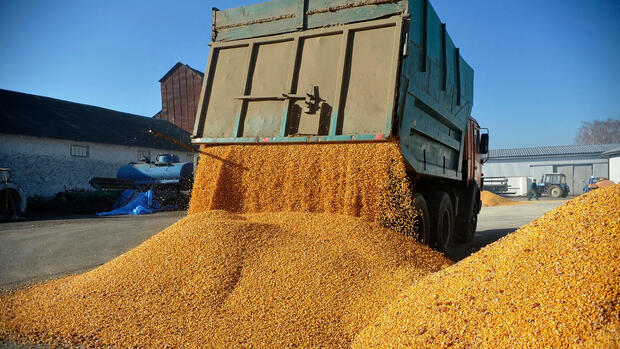Since the Russian invasion, Ukraine has not been able to export as much grain as before via the Black Sea seaports.
(Photo: dpa)
Brussels The dispute over grain imports from Ukraine is splitting the European Union. In a letter to the EU Commission, twelve agriculture ministers, including those from France and Germany, criticize a deal that the Commission had concluded with five Eastern European countries. The letter is available to the Handelsblatt.
The ministers write that they have “serious concerns” about the deal because it leads to different treatment in the internal market. They complain about a lack of transparency and demand an explanation as to why the EU is now paying 100 million euros to Eastern European farmers.
The background to the dispute goes back a long way: since the Russian invasion, Ukraine can no longer export as much grain via the seaports in the Black Sea. That is why the EU opened up the domestic market for Ukrainian imports. Huge amounts of wheat, corn, oil and sunflower seeds are now ending up in Ukraine’s eastern European neighbours.
Cereal import ban from Ukraine
After fierce peasant protests over alleged dumping prices, Poland, Hungary and Slovakia announced a unilateral ban on imports of Ukrainian grain in April. As a result, the EU Commission offered compensation payments of 100 million euros for farmers in Poland, Hungary, Slovakia, Romania and Bulgaria at the end of April.
The Brussels authorities also promised to help transport the grain to Western Europe.
The circumstances surrounding this deal are now angering other EU members. In addition to Germany and France, the Benelux countries, Austria, Denmark, Ireland, Greece, Estonia, Slovenia and Croatia also signed the protest letter to the Commission. They call on the Commission to return to a “transparent process”.
States demand explanation of EU calculations
A European solution is supported to address the problems in some member states, but not at the expense of the internal market, the letter said. One wants to know how other national markets are affected by the deal. The Commission must also explain “as soon as possible” how it came up with the financial requirement of 100 million euros and according to which key this money would be distributed.
After fierce peasant protests over alleged dumping prices, Poland, Hungary and Slovakia announced a unilateral ban on imports of Ukrainian grain in April.
(Photo: dpa)
In fact, there are still many unanswered questions. The deal stipulates that the Eastern European countries will let the grain back into the country – but only for transit.
The Commission has pledged to help organize ships, trucks and trains for onward transport to western European seaports.
However, it is not clear who will bear the additional costs. The European route is expensive: according to the Commission, the costs amount to 40 percent of the final price of the grain.
>>Read here: Europe’s support for Ukraine is flagging
Usually it’s ten percent. Therefore, no buyers for the grain had been found so far.
The Commission said on Friday it had received the letter and would respond in due course. The governments have been informed about the deal in the usual way, a spokeswoman said.
There was a first discussion in the Council of Member States on May 3rd, but the regulation has not yet been decided.
Due to the Russian war of aggression, an “unnatural market situation” has arisen in Ukraine’s five neighboring countries, the spokeswoman said, alluding to the fall in prices. “We have to address these.”
More: EU Commission wants to restrict trade with Ukraine again.
